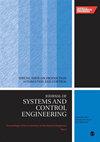通过滑模方法实现不确定离散时间奇异系统的事件触发 H∞ 控制
IF 1.5
4区 计算机科学
Q4 AUTOMATION & CONTROL SYSTEMS
Proceedings of the Institution of Mechanical Engineers, Part I: Journal of Systems and Control Engineering
Pub Date : 2024-04-18
DOI:10.1177/09596518241236976
引用次数: 0
摘要
本文通过[公式:见正文]滑模控制(SMC)分析了不确定离散时间奇异系统的事件触发(ET)方案。考虑了网络延迟问题,并使用伯努利随机变量解释其分布特征。利用 ET 方案建立滑模曲面(SMS)函数,并结合相应的滑模动力学(SMD)。然后,基于 Lyapunov-Kravoskii 函数(LKF)稳定性理论和线性矩阵不等式(LMI)技术,推导出闭环 SMD 的[公式:见正文]容许性准则。此外,还创建了基于 ET 策略的改进 SMC 规则,以便在有限时间内将系统轨迹驱动到规定的 SMS 上。最后,通过三个模拟实例证明了该方法的有效性。本文章由计算机程序翻译,如有差异,请以英文原文为准。
Event-triggered H∞ control for uncertain discrete-time singular systems via sliding mode approach
This article analyzes the event-triggered (ET) scheme for uncertain discrete-time singular systems via [Formula: see text] sliding mode control (SMC). The issue of network delay is taken into account, and a Bernoulli stochastic variable is used to explain its distribution feature. A sliding mode surface (SMS) function is built by using ET scheme, and the corresponding sliding mode dynamics (SMD) is combined. Then, based on Lyapunov-Kravoskii functional (LKF) stability theory and linear matrix inequality (LMI) technology, [Formula: see text]-admissibility criterion for closed-loop SMD is deduced. Additionally, an improved SMC rule based on ET strategy is created so that the system trajectories can be driven onto the prescribed SMS in finite time. Finally, the effectiveness of the approach is demonstrated by three simulated examples.
求助全文
通过发布文献求助,成功后即可免费获取论文全文。
去求助
来源期刊

CiteScore
3.50
自引率
18.80%
发文量
99
审稿时长
4.2 months
期刊介绍:
Systems and control studies provide a unifying framework for a wide range of engineering disciplines and industrial applications. The Journal of Systems and Control Engineering refleSystems and control studies provide a unifying framework for a wide range of engineering disciplines and industrial applications. The Journal of Systems and Control Engineering reflects this diversity by giving prominence to experimental application and industrial studies.
"It is clear from the feedback we receive that the Journal is now recognised as one of the leaders in its field. We are particularly interested in highlighting experimental applications and industrial studies, but also new theoretical developments which are likely to provide the foundation for future applications. In 2009, we launched a new Series of "Forward Look" papers written by leading researchers and practitioners. These short articles are intended to be provocative and help to set the agenda for future developments. We continue to strive for fast decision times and minimum delays in the production processes." Professor Cliff Burrows - University of Bath, UK
This journal is a member of the Committee on Publication Ethics (COPE).cts this diversity by giving prominence to experimental application and industrial studies.
 求助内容:
求助内容: 应助结果提醒方式:
应助结果提醒方式:


